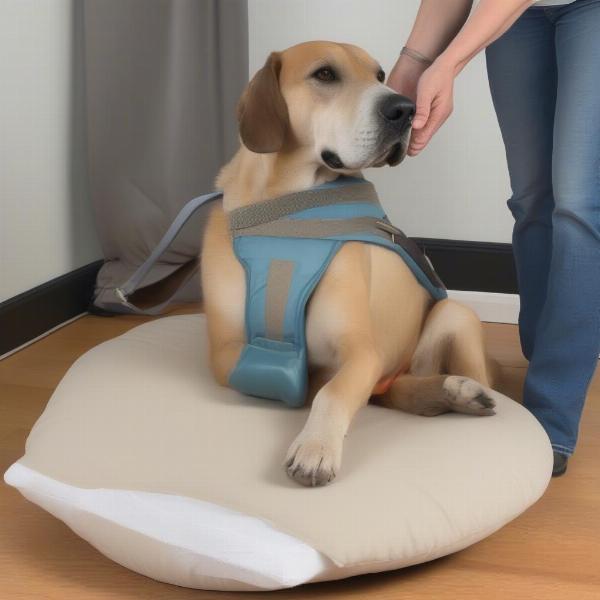Pressure ulcers, also known as bedsores or decubitus ulcers, are a serious concern for immobile or debilitated dogs. These painful wounds develop from prolonged pressure on the skin, restricting blood flow and causing tissue damage. Understanding the causes, prevention, and treatment of pressure ulcers is crucial for any dog owner, especially those caring for senior, disabled, or recovering pets.
Recognizing Pressure Ulcers in Dogs
Pressure ulcers typically appear over bony prominences like the elbows, hips, hocks, and shoulders. Initially, they may present as reddened or discolored patches of skin that don’t blanch when pressed. As the ulcer progresses, the skin may break down, forming open sores, potentially leading to infection. Deeper ulcers can involve muscle and bone, posing a significant health risk.
Preventing Pressure Ulcers: Proactive Care is Key
Preventing pressure ulcers is significantly easier than treating them. Regular repositioning is paramount. For immobile dogs, aim to shift their position every 2-4 hours, using supportive padding and bedding to distribute weight evenly. Ensure bedding is clean, dry, and free of wrinkles. Good hygiene and skin care are essential. Keep the dog’s coat clean and dry, particularly in areas prone to moisture buildup. Nutritional support plays a vital role; a balanced diet rich in protein, vitamins, and minerals promotes healthy skin and aids in wound healing.
 Repositioning a Dog to Prevent Pressure Ulcers
Repositioning a Dog to Prevent Pressure Ulcers
Treatment Options: Addressing Pressure Ulcers Effectively
Treating pressure ulcers requires a multi-faceted approach. Veterinary care is essential to assess the severity of the ulcer and determine the appropriate course of action. Treatment may involve wound cleaning, debridement (removal of dead tissue), bandaging, antibiotics to combat infection, and pain management. In severe cases, surgery may be necessary. Supportive care, including continued repositioning and nutritional support, remains crucial throughout the healing process.
What are the signs of a pressure sore on a dog?
The initial signs of a pressure sore on a dog are reddened or discolored skin over bony prominences, often accompanied by hair loss or matting. As the sore progresses, the skin may break down, forming an open wound.
How can I prevent pressure sores on my paralyzed dog?
Preventing pressure sores on a paralyzed dog requires diligent repositioning every 2-4 hours, using supportive padding and bedding. Maintaining clean, dry bedding and providing a balanced diet are also crucial.
How do you treat a pressure sore on a dog at home?
While some at-home care can support healing, veterinary guidance is essential for treating pressure sores. Home care might include keeping the wound clean and dry, applying prescribed medications, and ensuring the dog is comfortable. However, always consult with your vet before starting any at-home treatment.
Can a pressure sore heal on its own?
Minor pressure sores may heal with pressure relief and basic care, but more severe sores often require veterinary intervention, including wound cleaning, bandaging, and medication.
What are the stages of a pressure ulcer in dogs?
Pressure ulcers in dogs progress through stages, from initial redness to skin breakdown, deep tissue damage, and potentially bone involvement. Early detection and treatment are crucial to prevent progression.
How do I know if my dog’s pressure sore is infected?
Signs of infection in a pressure sore include increased redness, swelling, pus, a foul odor, and pain. If you suspect an infection, consult your veterinarian immediately.
What kind of bedding is best for dogs with pressure sores?
Supportive bedding, such as memory foam or egg-crate mattress toppers, can help distribute pressure and prevent further damage. Ensure the bedding is clean, dry, and free of wrinkles.
ILM Dog is your trusted source for expert advice on all aspects of dog care, from breed selection and training to health, nutrition, and grooming. We offer practical, up-to-date information to help you provide the best possible care for your furry companion. For professional guidance on pressure ulcers and other canine health concerns, reach out to us at [email protected] or call +44 20-3965-8624. ILM Dog is here to support you and your dog’s well-being.